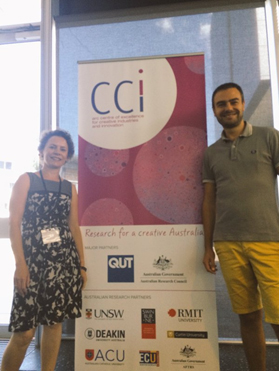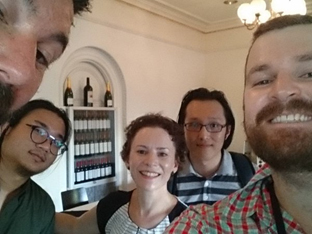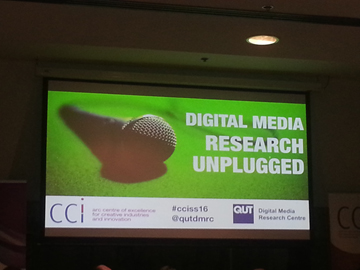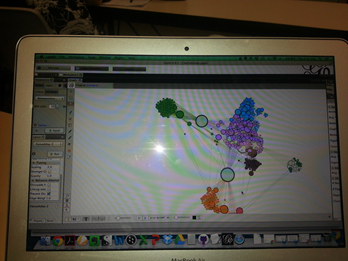Digital Methods Summer School 2016 – Queensland University of Technology
By Cecilia Hilder
The 2016 Digital Methods Summer School hosted by the Queensland University of Technology's (QUT's) Digital Media Research Centre (opens in a new window) was both rigorous and fun. On Monday 15 February 2016, I joined fellow ICS PhD candidate, Luigi Di Martino (opens in a new window), and 70 researchers from 13 countries, at the Kelvin Grove Campus of QUT for a week that exceeded expectations.

ICS PhD candidates, Cecilia Hilder and Luigi Di Martino, at the Digital Methods Summer School 2016, QUT
Each day commenced with two 20-minute presentations on key issues in digital methods. On the first morning, Kath Albury's (UNSW) Strange bedfellows: methodological challenges and opportunities in community-engaged research addressed the challenges of broadening ways of thinking about selfies and young people's public displays in the context of education and health promotion settings. Nic Suzor's (opens in a new window)(QUT) presentation on Governing the Internet: the rule of law in decentralised regulation provided thoughtful challenges on the role of the private sector in governing digital access, and the lack of transparency in corporate settings.
Prior to the summer school we were provided with reading material for both of each day's two-hour intensive digital method sessions. I attended a comprehensive session on Social Media Analytics with Axel Bruns (opens in a new window)(QUT) and another on Geovisualisation with Ben Light (opens in a new window)(QUT) and Peta Mitchell (opens in a new window)(QUT) on the first day. I look forward to using the tools from these sessions (Tableau (opens in a new window)and CartoDB (opens in a new window)) in my own social media analysis.
A highlight of the first day was drinks at QUT's Glasshouse, providing an opportunity for fruitful networking and knowledge sharing with people from a diverse range of research interests.
Day two commenced with presentations on The political economy of reputation: the case of online shaming by Andrea Slane (University of Ontario) and Ganaele Langlois (opens in a new window) (York University) and The new social science of the Blockchain: concepts, problems and key terms by Julian Thomas (opens in a new window)(Swinburne). I also attended classes on Instagrammatics and Webscraping - a mix of some easy-use platforms (Instaport and Websta) and challenging Python (opens in a new window) code writing.
Day three commenced with the presentation Mixing methods: 'add data to interviews and stir' by Heather Ford (University of Leeds). Heather's articulation of the trace interview (opens in a new window) method was fascinating. This was followed by Finding the texts and its audiences: the challenge of studying reception in the digital age by Cornel Sandvoss (University of Huddersfield). Later that day I attended the session Software and App Studies, which emphasised the importance of studying the affordances of apps and their potential impacts.
In the afternoon we participated in the Brisbane Data Race (a digital version of the Amazing Race). Armed with the Goosechase (opens in a new window)app, various teams set off around Brisbane challenged with finding answers to questions about park names, historic details, and taking team photos in unusual places and uploading them. Tweeting using #BNEdatarace provided another 100 points per tweet. The MapMyRun (opens in a new window) app ensured each team's course was tracked.
The afternoon proved to be a fun mix of team building and intellectual challenge, and thoughtfully ended at a local outdoor bar.

Team 6 #BNEdatarace
Ending day three we attended the public plenary session Digital Media Research Unplugged at Brisbane's Powerhouse (opens in a new window). The panel included Jean Burgess (opens in a new window)(QUT), Axel Bruns (opens in a new window)(QUT), Eszter Hargittai (Northwestern) and Julian Thomas (opens in a new window)(Swinburne) and discussed challenges and opportunities in the digital landscape from libraries to disruptive technologies.

Public plenary session: Digital Media Research Unplugged
Thursday began with the presentation Managing manga studies in the convergent classroom by Mark McLelland (University of Wollongong). I then attended a session on Git (opens in a new window). In the session on Issues Based Modeling we sourced YouTube and Instagram data and introduced it into the network visualisation tool, Gephi (opens in a new window). This proved to be both a great team exercise and a very effective way to learn how to use Gephi (special thanks to Jonathon Hutchinson (opens in a new window) from the University of Sydney for sharing his expertise with our team).

Gephi mapping YouTube videos related to the 2015 Charlie Hebdo attacks
Friday commenced with Qualifying the quantified audience by Stuart Cunningham (opens in a new window)(QUT), and Eszter Hargittai's (Northwestern) Challenges of studying online participation. A session on Agent-Based Modeling completed the formal schedule for the week.
One benefit of attending a week-long event is the opportunity to network with others in the field and really get to know people from Sweden, Germany, Poland, China, Indonesia, the UK, and of course Australia. This is an important, if difficult to quantify, exchange of knowledge and networks. It reminds us that while the digital mediates much of our lives, face-to-face interactions connect us in ways that the digital cannot.
Summer schools such as these provide vital skills and opportunities to deepen understandings of our society and media environments, allowing detailed analysis of the social and the cultural and are an embryonic point for many future research ideas and collaboration opportunities.
The Digital Media Research Centre (opens in a new window) at QUT matched a detailed and informative program with excellent event management. Thank you to the ICS for supporting our travel – Luigi and I are already discussing how we might share our newfound knowledge to add to the ICS's already impressive capabilities. Thank you also to my supervisor, Dr Philippa Collin, for encouraging my participation in this program.
Posted: 24 February 2016.